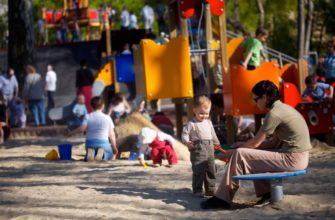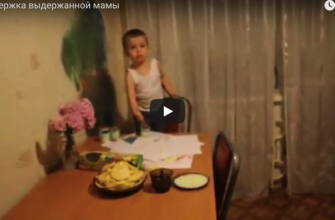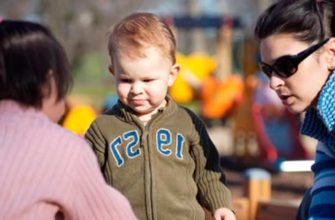It turned out that the road to school took us about an hour. We had to get there by metro, and if repairs suddenly started on our branch, we had to go with transfers. At first, the boys were interested - they looked out the window and invented stories about the life of the masters in the tunnel. Later we began to get tired of traveling, especially on the way home, and quarrels began. Once, when we were sitting in a subway car, I invited them to play - and since then we have tried many games. Long trips have become easier, besides the feeling that we lose a lot of time on trips (and time is always so pitiful!) Has disappeared - in games you could learn a lot.
Now I will describe some of our favorite games that we played and play (our children are 6 and 9 years old). They can also be used for children of other ages.
Cities
This is probably the most famous game when the first player calls a word (for example, “elephant”), the second comes up with a word starting with the last letter of the first word (for example, “rhino”), the third needs to say a word starting with the last letter of the second word ("peas") and so on in a circle. The one who does not manage to come up with a word leaves the game, although usually there are enough words for everyone and they play just until everyone gets bored.
At the beginning of the game, you need to agree that only nouns in the singular are used, diminutive words cannot be said, words should not be repeated. If a player’s word ends with “b,” “s,” or “b,” the next player comes up with a word starting with the penultimate letter. The letter “y” can be replaced by “and”, “e” by “e”.
You can enter a more strict rule - only name the city (hence the name of the game).
Note. When you play with children, do not be afraid to name words unknown to children. After all, so they will learn new things! Pay attention to the fact that we always remember how the word is written, and not how it is pronounced - in the game the children will imperceptibly and remember the correct spelling of the words.
Guess the number
This game is suitable for younger students who are just learning to count. The driver makes a number from 1 to 100, and each player tries to guess this number. To do this, players take turns calling their numbers, and the presenter says “more” or “less”.
For example, the driver guesses the number 43. The first player says: “4”, the driver answers: “More.” The second player says: "82", the driver says: "Less." The first is now: "36". Leading: "More." Second player: "40". Leading: "More." First: "45". Leading: "Less." Second: "43". Leading: “Guessed!”
Note. The smallest children call numbers at random, and even if the presenter has already said: “More than forty,” they, without hesitation, can answer “23” or “8”. Older people are already able to assess the extent to which you need to look for a number and how to narrow the search field.You can teach this to the youngest - but it would be nice to bring the child to it so that he guesses it himself and then with pleasure uses the method he has found to guess!
The package
This game develops the imagination and is already available for preschoolers, although for older people it becomes boring. The presenter says: “The parcel has arrived ...”, and then reports where the parcel came from (for example, from Moscow, from a toy store, with my father’s work) and what size it is (you can show with your hands). Players take turns saying what they’ll do with the package (they’ll eat, they will play with it, they’ll take it apart, etc.). Then the presenter tells what was in the package (he had to come up with it before the players answered): for example, a bicycle, a store seller, a pencil. The driver becomes the one whose answer turned out to be more appropriate (or, conversely, more ridiculous).
Note. The adult sets the tone by inventing the unexpected and funny content of the packages and various actions with them. He suggests that it is uninteresting to simply “see” or “put it on the table”, or you can “throw it on the moon” or “eat with ice cream”. It slightly limits the imagination of children if the actions they invent become very destructive or unpleasant (after all, a living creature or even one of the participants in the game may appear in the premise).
Repeat the chain!
The first player calls the word (noun in the nominative case, in the singular). Says, for example: "Cabbage!" The second one repeats this word and adds its own: “Cabbage - raccoon ...” The third pronounces three words already, for example: “Cabbage - raccoon - lamp ...” So the game continues in a circle. The one who is mistaken loses (will miss a word or cannot remember).
Note. Tell the children that mechanically memorizing words is rather difficult. It’s better to invent a story for yourself: “It’s growing in the garden cabbage. Approached raccoon and began to bite her. Suddenly someone lit it lamp... ”It will be interesting to share such stories at the end of the game.
The word begins with the letter ...
The presenter makes a word and calls it the first letter, for example, “k”. Players must guess words by asking questions in turn. The one who guesses the word wins.
Questions may be: “Is this an animal?” “Is this a red item?” "Does he know how to ride?", "Does he shout loudly?" etc.
Note. Younger children often give up, not being able to come up with a new question. Help them by suggesting how many questions you can compose and explaining that the more questions you ask, the more we can learn about the subject. And if at the beginning of the game ask questions like: "Is this a living being?" "This animal?" etc., then we can immediately narrow the field of our searches.
The game teaches the younger children to navigate the world (cactus - living or nonliving? What applies to transport? Etc.). Older students may show their erudition with might and main. Of course, when children of different ages play, we warn the elders that we need to guess the words available to the youngest child.
What do you take to the North
The Leader guesses by what principle he selects things or living things that he takes with him to the North. For example, it should be words with the letter “p”, or only animals, or something that can flow, or objects of green color. And he says, for example: "I take cucumbers with me to the North." Players take turns offering items (or animals, people) that they would like to take to the North, and the driver answers whether they can be taken or not. For example, a player wants to take tomatoes, and the driver thought that only green objects were taken, then he replies: "No, you can’t take tomatoes." But it allows you to take apples, grass, a green parrot. The player who guesses the principle conceived by the driver wins.
Doctor
The driver is the doctor, the rest of the players are his patients. The doctor closes his eyes and ears (or, if possible, moves away from other players), and the players figure out how they are sick. Everyone has one disease.When the doctor opens his eyes and ears, he will take turns asking everyone questions to find out what his wards are suffering from. A “disease” may consist in the fact that all players answer the doctor’s questions untruthfully, or their answers begin with the same letter, or when answering each one gently kicks the floor, touches the ear, etc. The host tries to guess, what the players agreed on, they try to answer the players so that their “illness” is not too noticeable. If one of the players forgets when answering the answer to fulfill what was agreed at the beginning, they say that he “recovered”.
These games can be played for a long time and many times. You can also guess on the road puzzles (and invent them yourself, describing unusually familiar objects), as well as compose fairy taleswhen each adds one sentence.
Games along the way helped us not only not to lose time - I felt that they were the three of us (as well as the brothers) being friends, because we had a common favorite pastime. Traveling somewhere is often difficult for parents - how many comments we manage to make for children! Games take us away from conflicts and give a sense of unity, which we expect from the family. I noticed that in riddles, children use what they read recently in books - and this adds us to topics for conversation.
Games make your head work - and this is useful for both parents and children, develop imagination, increase vocabulary. Games on the go - it's often and just very exciting! If you get tired of the road, check out Senora Boemondo by Gianni Rodari. This little story about daddy's trip with children is very inspiring to play!
Article author: Daria Velizhanina









